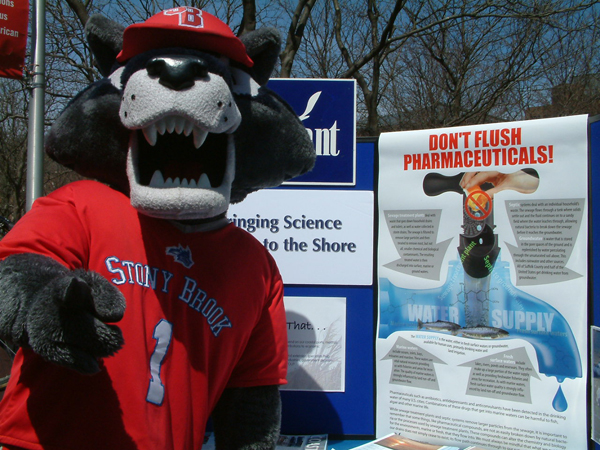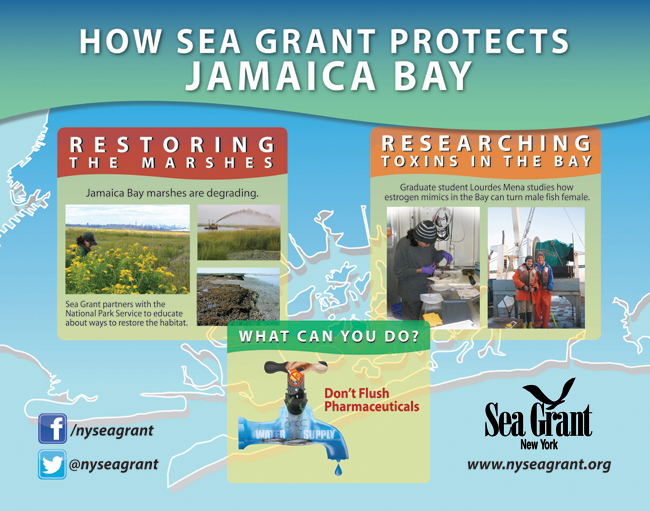New York, NY, April 18, 2013 - The first Earth Day - held on April 22, 1970 - garnered the support of participants and celebrants in 2,000 colleges and universities, roughly 10,000 primary and secondary schools, and hundreds of communities across the United States. More importantly, it brought 20 million Americans out into the spring sunshine for peaceful demonstrations in favor of environmental reform.
Since then, the Earth Day events - which demonstrate support for environmental protection - have expanded into weeks around the actual day and have gone global, being celebrated in over 192 countries and coordinated by the nonprofit Earth Day Network.
Many universities are preceding this Monday's annual day with a series of activities. Kingsborough Community College in Brooklyn, NY, for example, once again is in the middle of its Eco-Festival, the mission of which since 2007 is similar to many universities and organizations: to raise ecological literacy, foster civic and global citizenship, promote meanigful dialogue about environmental issues and sustainable development and inspire grassroots environmental action and stewardship.
Today, New York Sea Grant's (NYSG) Web Content Manager,
Paul C. Focazio, will take part in Kingsborough's Eco-Festival Share Fair, an opportunity to provide students, faculty and members of the local community with information from a variety of organizations, which also include the Metropolitan Waterfront Alliance, the New York State Marine Education Association, Riverkeeper, The Council on the Environment of NYC, MillionTreesNYC, plaNYC, New York Nature, Sierra Club NYC and Green for All, among others. Content that NYSG will offer is featured on this page below the "How Sea Grant Protects Jamaica Bay" poster, which encapsulates the theme of the program's Earth Day 2013 offerings. This ties in with Kingsborough's "My College, My Bay, Our Future" focus, which is detailed at
www.kingsborough.edu/eco-festival.
Tomorrow, Stony Brook University (SBU) offers the lecture/debate "Hurricane Sandy: Can We Continue Living at the Edge of the Sea?" Panelists include
Jay Tanski, NYSG Coastal Processes Specialist, and
Malcolm Bowman, Professor of Oceanography at SBU's School of Marine and Atmospheric Sciences. Bowman is also leader of the University's Storm Surge Research Group, which has received funding from NYSG for over a decade (
click here). Bowman, Tanski and the other experts will go in-depth with Sandy, which, since it struck the northeastern seaboard on October 29, 2012, has generated enormous concern surrounding Long Island's coastal areas. For many years, there has been development industrial, commercial, residential and recreational properties along our coastlines. We now ask ourselves the questions of whether we should rebuild, redesign, or retreat, and what is the legacy we are leaving to the next generation? The group will take on these issues at 4:00 p.m. in the University's Humanities Building, Room 1006.
You can learn about how
New York Sea Grant has since responded to Superstorm Sandy (
click here) and get more on the program's hurricane education and severe storm preparedness:
www.nyseagrant.org/hurricane.
On Friday, NYSG's Communications Manager,
Barbara A. Branca, will also be attendance at Stony Brook University's EarthStock Festival, which caps a week of environmentally-minded related events. The fest will be held from 10 a.m.- 4 p.m. in the University's Academic Mall, and features a keynote presentation at 7:30 p.m. in the Wang Center Auditorium. The speaker, Wallace Broecker, is the Newberry Professor of Geology at Columbia University and the Lamont-Doherty Earth Observatory. Dr Broecker is one of the world's most distinguished oceanographers and climate scientists, whose lecture will focus on how the build-up of greenhouse gases in the atmosphere is not just a worry or a scientific concern, but a planetary emergency.
For more on Stony Brook University's Earthstock events, check out
www.stonybrook.edu/commcms/earthstock/events.html.

Wolfie, Stony Brook Athletics' mascot, reminds folks at an Earthstock event what they should and shouldn't do with their unwanted medicines. For starters, New York Sea Grant (NYSG) says don't flush them. For the Earth Day events its staff are attending this year, NYSG is also spotlighting marsh restoration and toxins in New York's waterbodies, namely Jamaica Bay, a 39-square-mile estuary that includes portions of Brooklyn, Queens and Long Island's Nassau County.
Since 1995, Wolfie the Seawolf has been promoting Stony Brook Athletics around the University and in the local community. For more on "Wolfie's World," check out
www.goseawolves.org/wolfie
New York Sea Grant currently promotes green practices and stewardship statewide, which is showcased in this sampling of recent news items:
NYSG Urging April 27 Take Back Day Participation to Help Keep Drugs Out of Great Lakes (April 2013)
More>
NYSG Fact Sheet: Dose of Reality (pdf) [4 pgs]
Sea Grant Publication: Dose of Reality (pdf) [12 pgs]
More on Sea Grant's Unwanted Medicines Education Campaigns: www.nyseagrant.org/unwantedmeds
2013 Clean and Safe Boating Campaign Launches (April 2013)
More>
Seeking Teachers to Become Long Island Sound Mentors (April 2013)
More>
Students Wanted as New York Sea Grant Launch Stewards (March 2013)
More>
Volunteers Pitch in at Long Island Sound Study-designated Stewardship Areas (January 2013)
More>
New York Volunteers Augment Restoration’s Success in Southern Louisiana (January 2013)
More>
 Jamaica Bay Research
Jamaica Bay Research
Wetland loss is a serious concern in New York wetlands such as Jamaica Bay, a 39-square-mile estuary that includes portions of Brooklyn, Queens and Long Island's Nassau County. During the "State of the Bay: Past, Present and Future—Revisited" symposium, a New York Sea Grant (NYSG) co-sponsored event held at Brooklyn College in Fall 2011, scientists discussed restoration plans for the bay's salt marshes, which are being lost at a rate of 44 acres per year.
Revisiting Jamaica Bay's Restoration Issues (November 2011)
More>
Wetlands - Looking Back to the Future (
New York Coastlines, Spring 2008) (
pdf)
Proceedings: Jamaica Bay's Disappearing Marshes (2004) (
pdf)
Other related research ...
Scientists and managers discuss nitrogen in NY Bight (
New York Coastlines, Fall 2010)
More>
Tracing Sound Inputs via Groundwater (
New York Coastlines, Spring 2009)
More>
Estrogenic Compounds in Urban Waterways (New York Coastlines, Spring 2006) (
pdf)
Atlantic Sturgeon Research
Identifying Distinct Sturgeon Population Segments (
New York Coastlines, Spring/Summer 2012)
More>
Fact Sheet: Identifying Sturgeon Populations and Their Contributions to Coastal Aggregations (March 2012) (
pdf)
On YouTube: NYSG Research on Declining Atlantic Sturgeon (January 2011)
More>
Studying Sturgeon (
New York Coastlines, Spring/Summer 2006) (
pdf)
Community Supported Fisheries
WWWhat's Trending: Community Supported Fisheries Concept Simmers (
New York Coastlines, Fall 2012)
More>
Postcard: Seafood Throwdown - Local Resources (
pdf)
More on Community Supported Fisheries
More>
Social Media and E-Newsletter Promotional Materials
WWWhat's Trending: Currents, NYSG’s E-Newsletter, Makes Waves (
New York Coastlines, Fall 2012)
More>
NYSG's E-List Postcard: Fishing scene (
pdf)
"Get Social with Sea Grant" - Long Island Bays ecosystem
More>
"Get Social with Sea Grant" - Great Lakes ecosystem
More>
More Info:
New York Sea Grant (NYSG), a cooperative program of Cornell University
and the State University of New York, is one of 33 university-based
programs under the National Sea Grant College Program (NSGCP) of the
National Oceanic and Atmospheric Administration (NOAA). The NSGCP
engages this network of the nation’s top universities in conducting
scientific research, education, training and extension projects designed
to foster science-based decisions about the use and conservation of our
aquatic resources. Through its statewide network of integrated
services, NYSG has been promoting coastal vitality, environmental
sustainability, and citizen awareness about the State’s marine and Great
Lakes resources since 1971.
For updates on Sea Grant activities:
www.nyseagrant.org has RSS,
Facebook,
Twitter, and
YouTube links. NYSG also offers a free e-list sign up via
www.nyseagrant.org/coastlines for NY Coastlines, its flagship publication, and Currents, its e-newsletter supplement, each distributed 3-4 times a year.